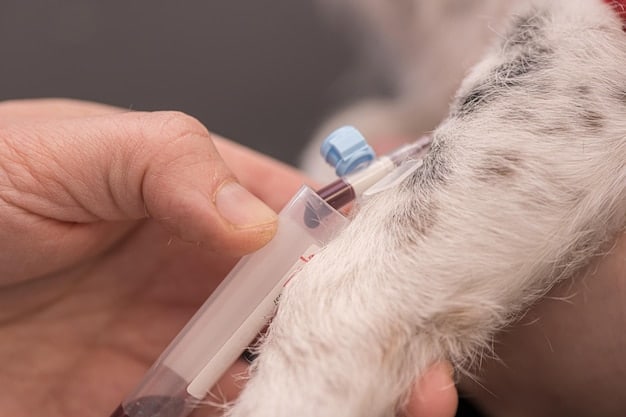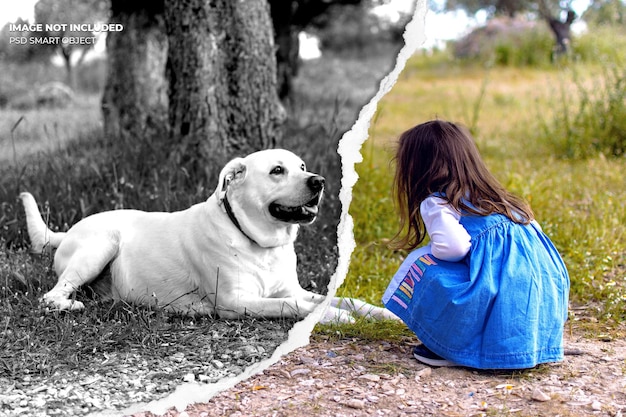Vaccinations for Pets: Your Comprehensive Guide to Pet Health

Anúncios
Vaccinations for pets are a crucial aspect of responsible pet ownership, safeguarding them from a range of preventable and potentially fatal diseases, contributing to their overall health and longevity.
Ensuring your pet receives the appropriate vaccinations for pets is a cornerstone of responsible pet ownership, offering protection against a variety of dangerous and even deadly diseases.
Anúncios
Understanding the Importance of Pet Vaccinations
Vaccinations play a vital role in maintaining your pet’s health. They stimulate the immune system to produce antibodies, providing protection against specific diseases. This preventative measure is far more effective and less costly than treating diseases after they manifest.
Why are vaccinations essential for pets?
Vaccinations are a cornerstone of preventive healthcare for pets, much like they are for humans. They protect against diseases that can cause serious illness, long-term complications, or even death. Keeping your pet up-to-date on their core vaccines is one of the best ways to ensure a long and healthy life.
Anúncios
How do vaccinations work?
Vaccinations work by exposing your pet’s immune system to a weakened or inactive form of a disease-causing organism. This triggers the immune system to produce antibodies, which are specialized proteins that recognize and attack the organism if it ever enters the body again. In essence, vaccinations “teach” the immune system how to fight off specific diseases.
- Provide immunity against potentially fatal diseases.
- Reduce the severity of illness if your pet does contract the disease.
- Help prevent the spread of diseases to other animals.
- Contribute to the overall health and well-being of your pet.
Vaccinating your pet has broader implications. It helps to maintain a healthy pet population in the community, reducing the risk of outbreaks and protecting vulnerable animals, such as puppies, kittens, and senior pets, who may not be able to be fully vaccinated.

Core Vaccinations for Dogs and Cats
Core vaccinations are those recommended for all dogs and cats, regardless of lifestyle. These vaccines protect against diseases that are prevalent, highly contagious, and can have severe consequences.
Core vaccines for dogs
The core vaccines for dogs typically include those that protect against canine parvovirus, distemper, adenovirus (hepatitis), and rabies. These diseases can cause severe illness, and even death, in unvaccinated dogs. The combination vaccine, often called DHPP, covers distemper, hepatitis, parvovirus, and parainfluenza.
Core vaccines for cats
For cats, core vaccines include those that protect against feline viral rhinotracheitis (herpesvirus), calicivirus, panleukopenia (feline distemper), and rabies. These diseases can be particularly dangerous for kittens. The combination vaccine, often called FVRCP, covers rhinotracheitis, calicivirus, and panleukopenia.
- DHPP (Dogs): Protects against Distemper, Hepatitis, Parvovirus, and Parainfluenza.
- Rabies (Dogs & Cats): Required by law in most areas to protect against rabies virus.
- FVRCP (Cats): Protects against Feline Viral Rhinotracheitis, Calicivirus, and Panleukopenia.
Understanding which vaccines are considered core and why they are essential is the first step in ensuring your pet receives the necessary protection. Discussing your pet’s lifestyle and risk factors with your veterinarian will help determine if any non-core vaccines are also recommended.
Non-Core Vaccinations: Lifestyle Considerations
Non-core vaccinations are recommended based on your pet’s lifestyle, geographic location, and risk of exposure to certain diseases. These vaccines provide extra protection against diseases that are not as prevalent but can still pose a significant threat to susceptible animals.
Non-core vaccines for dogs
For dogs, non-core vaccines may include those that protect against Bordetella (kennel cough), leptospirosis, Lyme disease, and canine influenza. These vaccines are typically recommended for dogs that are frequently exposed to other dogs in boarding facilities, dog parks, or training classes, or that live in areas where these diseases are prevalent.
Non-core vaccines for cats
Non-core vaccines for cats may include those that protect against feline leukemia virus (FeLV) and feline immunodeficiency virus (FIV). These vaccines are generally recommended for cats that go outdoors or live in multi-cat households where they may be exposed to infected cats.
Knowing which non-core vaccines are available and whether they are right for your pet is an important part of creating a comprehensive vaccination plan. Consulting with your veterinarian will help you assess your pet’s risk factors and make informed decisions about their vaccination needs.

Vaccination Schedules and Boosters
Following a proper vaccination schedule is crucial for ensuring your pet develops and maintains immunity to preventable diseases. Puppies and kittens require a series of vaccinations to build their initial immunity, followed by booster shots to maintain long-term protection.
Puppy and kitten vaccination schedules
Puppies and kittens typically receive their first vaccinations at around 6-8 weeks of age, with subsequent boosters every 3-4 weeks until they are approximately 16 weeks old. This series of vaccinations helps to overcome interference from maternal antibodies and ensure they develop their own protective immunity. It’s important to note that the exact schedule may vary depending on the individual pet and the specific vaccines used.
Booster shots for adult pets
Adult pets require periodic booster shots to maintain their immunity to preventable diseases. The frequency of booster shots will depend on the specific vaccine and your veterinarian’s recommendations. Some vaccines, such as rabies, may be required by law to be administered every 1-3 years.
- Puppies and kittens need a series of vaccinations starting at 6-8 weeks old.
- Booster shots are crucial for maintaining immunity in adult pets.
- Follow your veterinarian’s recommended vaccination schedule.
Knowing the proper vaccination schedule for your pet and adhering to it is vital for ensuring they maintain optimal protection against preventable diseases. Regular check-ups with your veterinarian will help you stay on track with your pet’s vaccinations and address any concerns you may have.
Potential Side Effects and Risks
While vaccinations are generally safe and effective, it’s important to be aware of the potential side effects and risks associated with them. Most side effects are mild and temporary, but in rare cases, more serious reactions can occur.
Common side effects
Common side effects of vaccinations in pets include mild fever, soreness at the injection site, lethargy, and decreased appetite. These side effects typically resolve within 24-48 hours. Some pets may also experience a small, temporary swelling at the injection site.
Serious adverse reactions
Serious adverse reactions to vaccinations are rare but can include allergic reactions, such as facial swelling, hives, difficulty breathing, and collapse. These reactions typically occur within minutes to hours of vaccination and require immediate veterinary attention.
Understanding the potential side effects and risks associated with vaccinations can help you be prepared and take appropriate action if your pet experiences any adverse reactions. It’s important to discuss any concerns you have with your veterinarian prior to vaccinating your pet.
- Most side effects are mild and temporary.
- Serious reactions are rare but require immediate veterinary attention.
Debunking Common Vaccination Myths
There are many misconceptions about vaccinations for pets, which can lead to confusion and reluctance to vaccinate. It’s important to debunk these myths and rely on accurate information from trusted sources, such as your veterinarian.
Myth: Vaccinations are unnecessary
Fact: Vaccinations are essential for protecting pets from potentially fatal diseases. They stimulate the immune system to produce antibodies, providing immunity against specific pathogens.
Myth: Vaccinations cause autism in pets
Fact: There is no scientific evidence to support the claim that vaccinations cause autism in pets. This myth originated from a discredited study in humans and has been thoroughly debunked by the scientific community.
- Vaccinations are necessary to protect pets from preventable diseases.
- Vaccinations do not cause autism in pets.
- Consult your veterinarian for accurate information about vaccinations.
Knowing the facts about vaccinations and dispelling common myths can help you make informed decisions about your pet’s health. Relying on evidence-based information from reputable sources is crucial for protecting your pet’s well-being.
| Key Point | Brief Description |
|---|---|
| 🛡️ Core Vaccinations | Essential for all pets, protecting against prevalent and severe diseases. |
| 🐾 Non-Core Vaccines | Based on lifestyle, location, and risk, offering extra protection. |
| 📅 Vaccination Schedule | Puppies/kittens need a series; adults need boosters for continued immunity. |
| 💉 Side Effects | Generally mild; serious reactions are rare but require vet attention. |
Frequently Asked Questions
Vaccinations are vital because they protect your pet from serious, sometimes fatal, diseases by building immunity. They also help prevent the spread of disease to other animals.
For dogs, core vaccines include parvovirus, distemper, adenovirus, and rabies. For cats, they include feline viral rhinotracheitis, calicivirus, panleukopenia, and rabies.
Booster shot frequency depends on the vaccine and your veterinarian’s recommendations. Some vaccines, like rabies, might be required by law every 1-3 years.
Most side effects are mild, such as fever or soreness. Serious reactions are rare but require immediate veterinary attention. Discuss concerns with your vet.
You can get your pet vaccinated at your local veterinary clinic. Schedule a consultation to discuss the best vaccination plan for your pet’s specific needs.
Conclusion
Vaccinations for pets are a fundamental component of responsible pet care, significantly contributing to their health, longevity, and overall happiness. By understanding the types of vaccines, schedules, potential side effects, and dispelling common myths, you can make informed decisions in partnership with your veterinarian to ensure your furry friend receives the best preventative care possible. Prioritizing vaccinations is an investment in your pet’s well-being and strengthens the bond you share.






